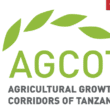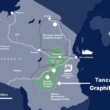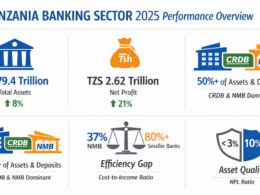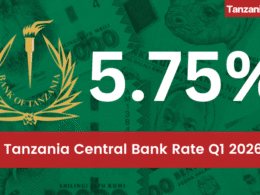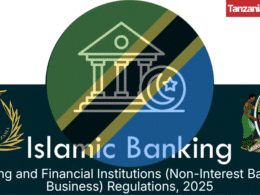The Tanzania Economy Overview
TANZANIAINVEST has been interviewing Mr. Daudi T. Ballali, former Governor of the Bank of Tanzania (BOT), to learn about the economic outlook of the country.
| Daudi Ballali, Governor of the Bank of Tanzania |
TI: The Central Bank of Tanzania (BOT) has been praised for its efforts and achievements in bringing down inflation, from a rate of 30 % at the beginning of the first mandate by President Mkapa in 1995 to the actual rate of around 5% per year. How have such results been achieved?
Daudi Ballali – Bank of Tanzania: We have pursued a very tight monetary policy which has been sustained by a thigh fiscal policy.
In 1995, the budget debt was very important while now the budget is balanced. Also, the acquired independence of BOT helped.
Although BOT was already highly respected by the Government and its opinion has always mattered in Tanzania from the beginning, true independence only came with the Bank of Tanzania Act of 1995.
Today, we are at the centre of policy making and the government always consults us.
For example, to make sure that the government is expending according to plan, every month BOT has to confirm that the intelligence of the Ministry of Finance is consistent with the resources that are available.
TI: What does BOT do in order to accompany the Government’s growth policies towards the objectives of 8% GDP growth included in the 2025 country vision?
DB: We worked together with the government to select key sectors that can inspire faster growth.
We have selected three sectors and since the beginning of President Mkapa’s government we have worked on them.
{xtypo_quote_right} Key sectors that can inspire faster growth [are] mining, capital intensive manufacturing for exports and tourism.{/xtypo_quote_right} These sectors are mining, capital intensive manufacturing for exports and tourism.
For this purpose, when President Mkapa came into power in 1995, he immediately ordered the revision of the mining law.
The new Mining Act came into operation in early 1998 and all the big mining companies around the world were invited to an international conference held in Arusha for its presentation.
Since the introduction of this new investment law, gold has become the major export in Tanzanian economy.
{xtypo_quote_right}Today, we are competing with Ghana and Mali to become the second biggest African producer of gold{/xtypo_quote_right}Today, we are competing with Ghana and Mali to become the second biggest African producer of gold, only after South Africa.
It is interesting to note that, as opposed to our competitors, we are growing extremely fast since we started only years ago from a virtually non-existent gold mining industry.
We are now doing the same with the manufacturing for exports.
We want to take advantage of the African Growth and Opportunity Act – AGOA and the Everything but Arms agreement with the EU and start labor intensive manufacturing for exports to these countries.
This is very important for us because it will dramatically help to reduce unemployment.
Such reduction in unemployment will consequently generate an increase of the purchasing power for people in the cities which, in turn, will create demand for agricultural products, housing and so forth.
We have just started our focus on the manufacturing for exports but we already have some companies established in our export processing zones and there are quite a few coming.
TI: To this regard, what do you consider to be the greatest challenges for Tanzanian products to enter such marketplaces and to develop exports in a sustainable way?
DB: Tanzania still remains a much closed economy. Tanzanian exports represent just 10% of the GDP while the average for Africa is about 25%.
It is a large economy, but a closed economy; we have to open it up through exports.
Our aim is to attract foreign investments which will produce and export.
{xtypo_quote_right}Thanks to the Everything But Arms agreement conceded to Tanzania and to a specific set of countries, we can enter the EU market duty-free and also quota-free.{/xtypo_quote_right}Thanks to the Everything But Arms agreement conceded to Tanzania and to a specific set of countries, we can enter the EU market duty-free and also quota-free.
As long as this regime exists we are able to attract companies to invest from Sri Lanka, Taiwan, and China, for example, which are already exporting to EU but don’t have the duty free entry; in this sense there is a major attraction for them to come to Tanzania to invest.
TI: You have mentioned three main sectors. You have explained to us about mining and manufacturing for exports. Could you give us an outlook about tourism activities in Tanzania?
DB: Tourism is, in some ways, natural for Tanzania.
Even when we do very little in this sector some investment goes into tourism because of our natural endowment.
From 1996 until September 11 [2001], we experienced a 20% growth per year in this sector, but after that we faced a slow down, especially in 2002.
In 2003, we saw it rising back and since 2004 it has been booming again.
We are witnessing increasing investment in tourism with minimum marketing activities on our part, but we believe that this is not enough.
For example, we have improved access to our game park by building better roads and we want to attract major international tour operators either by linking up with our own tour operators or through other means.
The Tanzania Banking and Capital Markets Sectors
TI: When referring to the banking sector, some analysts argue that most of the deposits mobilized by banks operating in Tanzania are lent for short term financing, mainly for import-export activities, or invested in less risky treasury bills and bonds. What is your opinion on that?
DB: That is all history.
In 1993 we had one commercial bank, The National Bank of Commerce; today we have 23 commercial banks and 12 non-bank financial institutions operating in Tanzania.
It is a major transformation in 12 years. It is true that the banks that came early had the tendency to hold treasury bills, but today they are competing for customers.
In fact, just {xtypo_quote_right}Two years ago you couldn’t find a single bank going for consumer financing; today consumer loans are the hottest thing in the banking and finance sector.{/xtypo_quote_right}two years ago you couldn’t find a single bank going for consumer financing; today consumer loans are the hottest thing in the banking and finance sector.
Things change here very fast. Although we now have 23 commercial banks, I still believe there are a few more players to come in; there is enough room to expand so the attraction is still there.
TI: What do you believe is the most important impact of such an increasing competition in the sector?
DB: It brings efficiency, it reduces costs and it provides funds to people that otherwise would not be able to borrow in the banking system, and usually these happen to be small entrepreneurs that can successfully grow.
TI: How would you assess the results in the creation of the Dar es Salaam Stock Exchange?
DB: It has been very useful, particular in assisting the divestiture of the once government-owned companies which have been privatized.
The part held by the government has been sold to the general public and this has facilitated ownership of these companies by the citizens of Tanzania.
Having said that, the Dar es Salaam Stock Exchange is expected not to grow very fast because many businesses in Tanzania are family owned and thus somewhat reluctant to go public as a means of acquiring additional capital.
TI: What is the feedback you receive about your country during your frequent travels abroad?
DB: People are very much encouraged about what we have been able to do in the last ten years.
Our real challenge now is to maintain macroeconomic stability as we did in the last few years and to attract investments in order to keep increasing the growth in our GDP that should eventually achieve the 8% GDP growth forecasted for 2005.
TI: What would you like to make sure foreign investors understand about Tanzania?
DB: I would like them not to look at Africa as a country.
{xtypo_quote_right}Africa is a continent and within that continent performances of various countries considerably differ. [Foreign investors] should look at Tanzania with an open mind.{/xtypo_quote_right}Africa is a continent and within that continent performances of various countries considerably differ.
The same applies to political stability, which we in Tanzania have had for a very long time.
They should look at Tanzania with an open mind.
We are very different from what we were during the 80´s, with improved macro-economical stability, we developed better infrastructures, more efficient banking systems and telecommunications, together with the introduction of major structural reforms and we are now a very good destination to invest in.


